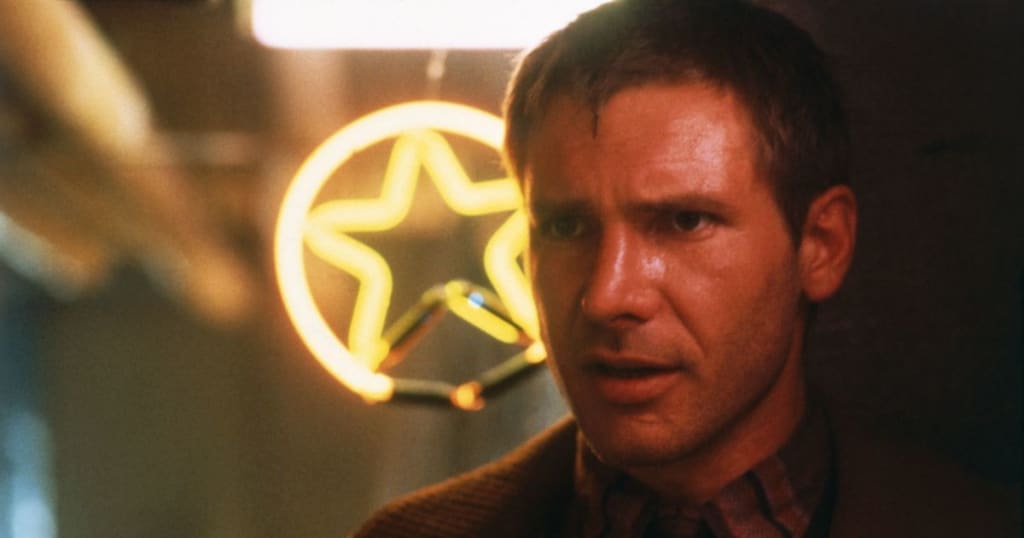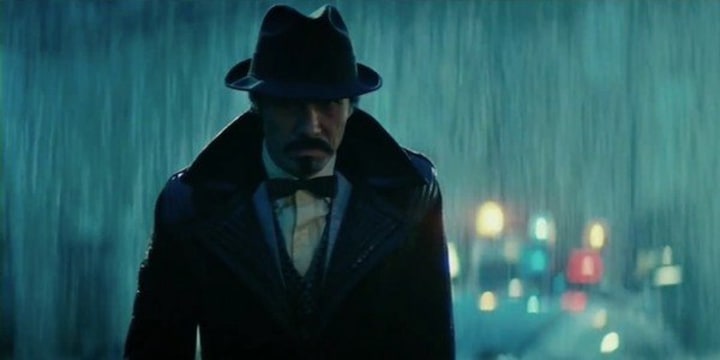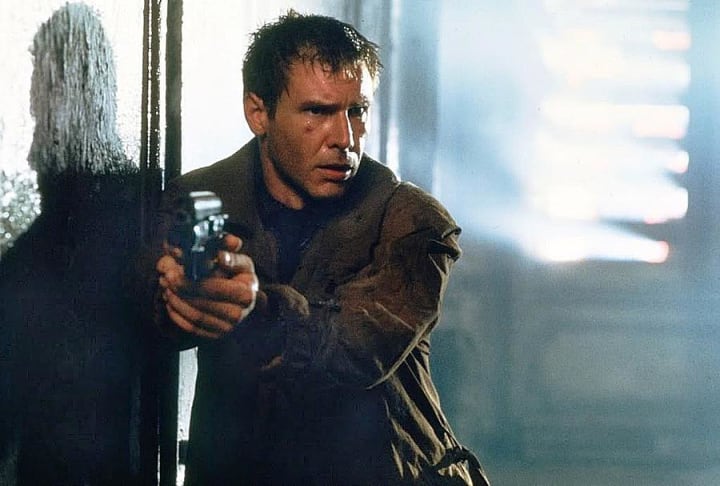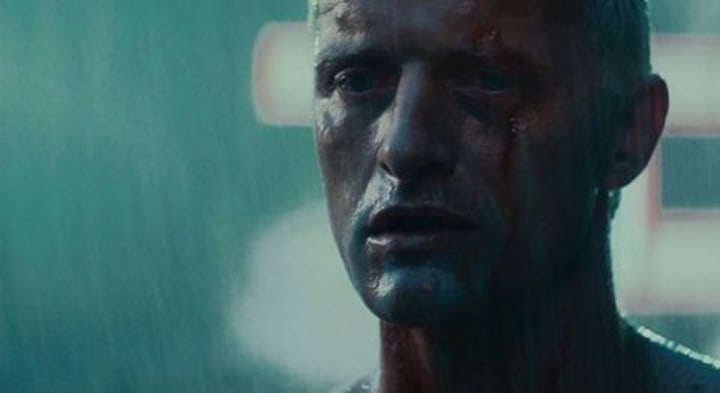Blade Runner (1982): What was it all about?
A look back at Ridley Scott's monumental sci-fi masterpiece.

Released in 1982, three years after Ridley Scott's monumental sci-fi classic 'Alien', 'Blade Runner' is, without a doubt, one of the most popular and influential science-fiction films ever made - but it wasn't always seen as such.
Let's take a look back at one of sci-fi's most acclaimed works of art.
Based on Phillip K Dicks 'Do Androids Dream of Electric Sheep' that was first published in 1968, 'Blade Runner' is centred around Rick Deckard (Harrison Ford) an ex-policeman, hired as a special agent to find and "retire" aka kill, four replicants (bioengineered humanoids) who recently arrived on Earth illegally. The replicants are nexus-6 models, named Leon, Pris, Zhora and Roy Batty. A Blade Runner is the title given to someone who retires replicants.
'Blade Runner' originally tore critics apart, with some predicting its cult-like following and giving it the praise it deserved while others criticised the slow-burning plot and lack of action. It lacked the horror and wow factor of 'Alien' and didn't have the family appeal of 'E.T', which came out the same year. There wasn't a lot of space for 'Blade Runner' in 1982 on many people's watchlist yet it quickly amassed an avid fan base that only grew over the years. It is now regarded as, quite possibly, the most impactful sci-fi film of all time and definitely one of the greatest movies ever made.
Here's why:
Set against the backdrop of a future Los Angeles, overpopulated and technologically advanced, the film houses unbelievably imaginative visual effects and cinematography. The detail put into making the world cannot be understated and it really helps it stand the test of time.
The incredibly detailed and layered plot of the film is backed by a melancholic and fantastic musical soundtrack from Greek composer Vangelis. The score is one of the most enchanting parts about this film and that's definitely saying something. The film has roots in noir films and westerns , while also creating a whole genre in itself - cyberpunk.
In its essence 'Blade Runner' is a futuristic film noir detective thriller, revolutionising the classic tropes of the lonely hero with confusing moral ethics, the femme fatale and the voice-over narration. Many films have tried and failed to replicate the feel of 'Blade Runner'.

Throughout the film there is a large emphasis placed on eyes. Widely regarded as the "Windows to the soul", this emphasis highlights the importance of having a soul, memories, emotions - things we identify as making someone innately human.
This is just another reason why 'Blade Runner' still has people talking about it, so many years after its original release. The importance of this films dive into incredibly deep and difficult questions on modern day masterpieces can not be understated.
Edward James Olmos plays Gaff, a cop watching over and checking in on Deckard from time to time. It's really the little details that make this movie, like the meaning behind the tiny origami pieces Gaff makes throughout.

When Deckard turns down the job at the start, Gaff places a paper figurine of a chicken on the table next to him, presenting his opinion of him to the audience as a coward. After learning of Deckard's new found romance with Rachel (Sean Young), a replicant with programmed memories that make her originally believe she is human, he places a piece of paper sculpted into a man with an erection for Deckard to find. It's his way of telling him he knows what he's doing while having a bit of fun with Deckard.
This methodical and intriguing subtlety makes the ending, still widely disputed and controversial, so much better. As Deckard and Rachel are escaping, he finds an origami unicorn on the floor, placed there by Gaff. Throughout the film, Deckards has a recurring dream of a unicorn running through a forest. The origami unicorn symbolises Gaff's knowledge of the dream, thus indicating Deckard is a replicant. Many still argue over whether or not he was one to this day, cementing this film as one of the all time greats.
Rutger Hauer plays the "villain", Roy Batty a smart, tough and emotional replicant who faces off against Deckard in the staggering climax at the end of the movie. His performance can not be praised enough and he really brings the character to life in a way few others could. His monologue at the end of the film has gone down in history as one of the best pieces of writing in film, only amplified by the beautiful cinematography and symbolism accompanying it.

The point 'Blade Runner' is trying to make is that it isn't what we look like that makes us human, its our memories and the emotions they elicit. Batty understands this and chooses to save Deckard's life as his final act alive, destroying Deckard's view of what a replicant really is. Batty isn't the "bad" guy, he is simply a man trying to stay alive.
The scene is deeply poetic, thanks to Hauer and his improv, as he describes the incredible things he's seen and felt. All those things will die with him and that's why he's been fighting to stay alive, even if it's just for a few more seconds. In saving Deckards life he can exist onwards in his memories, essentially making his feelings, memories and everything that makes the replicant a human, immortal.
It's in this final showdown between Batty and Deckard, as Batty dies, the most clear religious symbolism appears in the form of a white dove, flying off as he dies. The nail Batty pushed into his hand (like Christ) to stay alive a few minutes more, is the hand that inevitably catches Deckard as he falls, saving his life.

So now you've heard some of the reasons why it's held at such high esteem, where could this masterpiece possibly go wrong? Well...
Since this is basically the film that got me into films it's hard to flaw it. But no film is perfect and everyone will have their own likes and dislikes. So lets get into it.
'Blade Runner' is...long. It's entirely fair to say this film drags. A lot of time is spent building the world the characters inhabit and personally, I could agree it wouldn't have killed Ridley Scott to throw in a little more tension and action.
That being said, the slow flow to this film is kind of its greatest strength. You'd be hard pressed to find another film that draws you in so easily as this one. This is partly due to a standout score, gorgeous set design and directing, and mostly due to the long time spent exploring future LA in all its bleakness.
There are several versions of this film and, to be honest, not all are great. I watched the Final Cut first and it is, by all accounts, the definitive 'Blade Runner'. The cheesy narration in the Theatrical Cut doesn't hold up very well and the extended ending just doesn't fit into the bleak world the film spent so long creating.
Taking all of this into consideration there is still no cut of 'Blade Runner' that is downright bad or even mediocre. But watch the Final Cut. Please.

It's important to note that despite all of 'Blade Runner's' originality and unbelievably high standard of quality all round, its most unique aspect lies in its story. While exploring what it truly means to be human, the film has no outright "good" guy or "bad" guy; it's up to you to interpret which is which and who is who. It's up to you to decide what it means to be human.
Hi! I'm glad you made it to the end of this analysis. Wanna read more? Check out my page for my in-depth analysis and reviews of all kinds of media and feel free to leave a like or a even a tip if you want to see more of this kind of content - Ciarán
About the Creator
Ciarán Coleman
'There's no time for hatred, only questions
What is love, where is happiness
What is life, where is peace?
When will I find the strength to bring me release?'
- Jeff Buckley
Interested in me writing for you?
Gmail; [email protected]






Comments
There are no comments for this story
Be the first to respond and start the conversation.